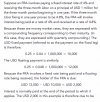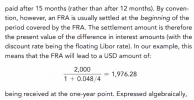wrongsaidfred
Member
Hi David,
For certain instruments, like an FRA or swap, do the terms long and short necessarily mean anything? If someone is long an FRA, does this mean that they are locking in a rate they are paying at or a rate they will be paid at? Same idea for a swap. Does long mean they are fixed payer or floating payer?
Also, do FRAs still use the 2 x 5 notation or is there something else we should expect to see?
Thanks in advance for any guidance.
Mike
For certain instruments, like an FRA or swap, do the terms long and short necessarily mean anything? If someone is long an FRA, does this mean that they are locking in a rate they are paying at or a rate they will be paid at? Same idea for a swap. Does long mean they are fixed payer or floating payer?
Also, do FRAs still use the 2 x 5 notation or is there something else we should expect to see?
Thanks in advance for any guidance.
Mike


